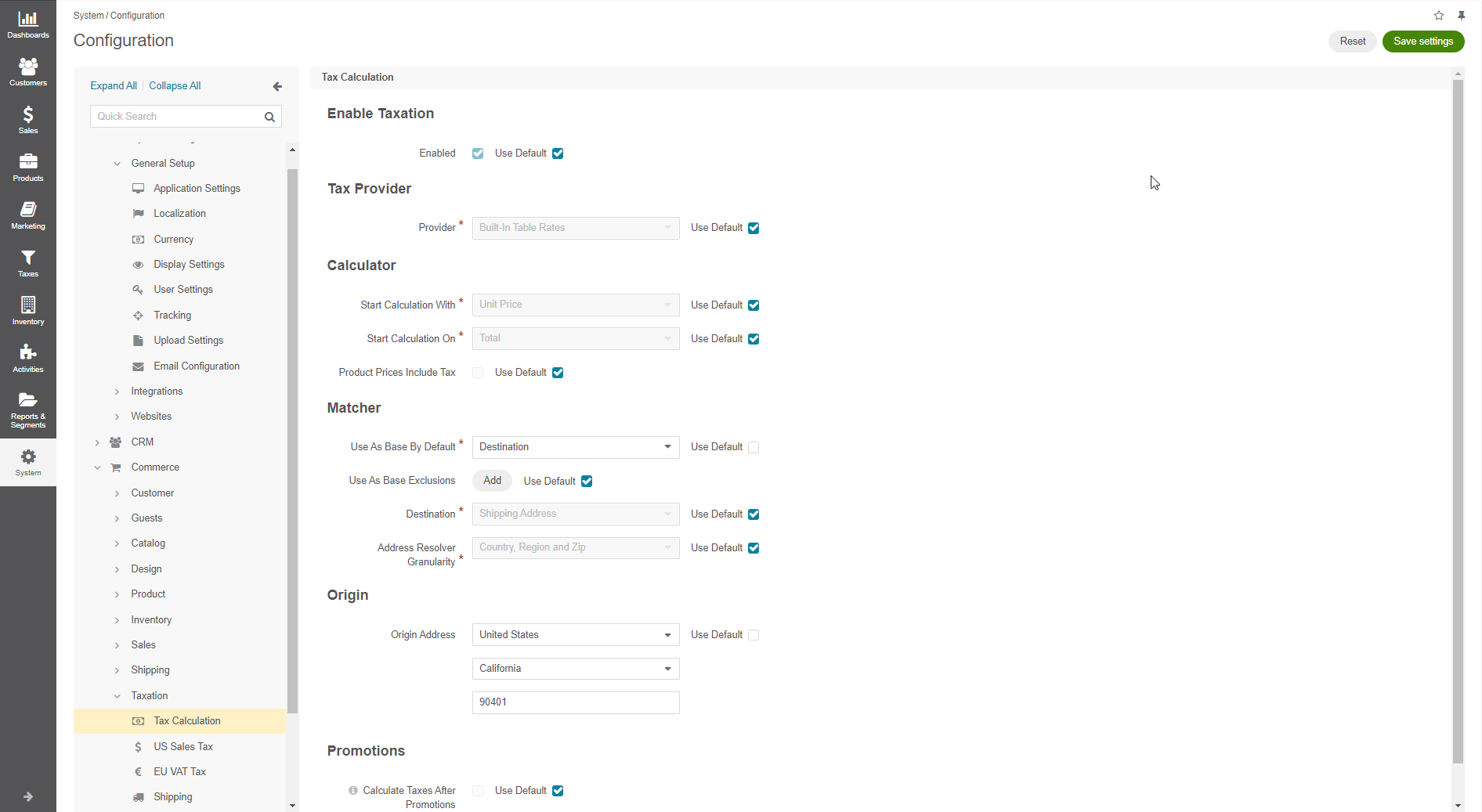Important
You are browsing the documentation for version 1.6 of OroCommerce, OroCRM and OroPlatform, which is no longer maintained. Read version 5.1 (the latest LTS version) of the Oro documentation to get up-to-date information.
See our Release Process documentation for more information on the currently supported and upcoming releases.
Tax Calculation
By default, OroCommerce calculates tax using a rate defined in the built-in tax rule for the default shipping origin address.
You can modify the following configuration settings that impact the way OroCommerce implies tax in the Purchase Order or Quote (see Configure Tax Calculation for detailed guidance):
Enable or disable tax calculation for the products you sell.
Select a tax provider. OroCommerce build-in Table Rates - the tax rules defined in Manage Tax Rules section below - are used by default. Alternatively, with some customization, you can use external tax management and compliance system, like AvaTax or Vertex, as a tax provider.
Apply taxes per single item in the purchase order or per total for the requested amount of the items of same kind. This may minimize roundoff accumulated error and guard you and your customers against over or under paying.
Configure how OroCommerce selects the core jurisdiction for which tax rules should be applied in a purchase order tax calculation. Tax jurisdiction may be defined by either shipping origin, billing address or shipping destination.
Set up any tax jurisdiction exceptions - countries and states where tax jurisdiction selection deviates from the core rule. For example, when the main tax jurisdiction is at the sale shipping destination, the exception may be for some countries and states to use shipping origin instead.
Determine whether the tax is included in the product price. When this option is enabled, the product price displayed in the purchase order will increase by the value of tax for this product item. Note: This may complicate the tax returns and deduction for your customers who are businesses.
Configure a shipping origin address that will be used system-wide for origin-based tax. When the shipping origin is a core jurisdiction, OroCommerce will use the address provided here to find the matching built-in tax jurisdiction rules for tax calculation.
Configure Tax Calculation
To customize tax calculation in OroCommerce:
- Navigate to the system configuration (click System > Configuration in the main menu).
- Select Commerce > Taxation > Tax Calculation in the menu to the left.
Note
For faster navigation between the configuration menu sections, use Quick Search.

Note
Remember to clear the Use default check box before setting a custom option.
- In the Enable Taxation section, enable or disable taxation by setting or clearing the Enabled box.
- In the Tax Provider section, keep the default Built-in Table Rates or, if you have extended the default capabilities and set up an integration, select your custom tax management system.
- In the Calculator section:
- With Start Calculation With, specify the formula for tax calculation. Tax is calculated either for a unit price or for a product total price. The formula for Unit price is: tax = [ ( unit price * tax rate ) * unit quantity ] + … + [ ( unit price * tax rate ) * unit quantity ]. The formula for Row Total is: tax = [ (unit price * unit quantity) * tax rate ] + … + [ (unit price * unit quantity) * tax rate ].
- With the Start Calculation On option, select when the rounding off shall happen. For Item, the taxable amount is rounded up for every item. For Total, the total tax is aggregated as is, and the final amount is rounded up.
- Set or clear the Product prices include tax option. When product prices include tax, the tax amount is subtracted from the unit, product, or total price. Otherwise, the tax is added on top of the unit, product, or total price.
- In the Matcher section:
- Select the default tax jurisdiction base:
- For the origin-based jurisdiction, select Shipping Origin, or
- For the destination-based jurisdiction, select Destination.
- Specify all countries and states/regions that do not follow the default tax jurisdiction base. Click + Add, select a country, type in a state or a region and select the alternative tax jurisdiction base.
- If you use destination as tax jurisdiction base by default or for any exclusions, select either Shipping Address or Billing Address as Destination.
- Select the default tax jurisdiction base:
- In the Origin section, provide the origin address (e.g. location of your warehouse or the company legal address). For the origin-based jurisdictions, OroCommerce uses this address to find the matching tax rule.
- Click Save.

